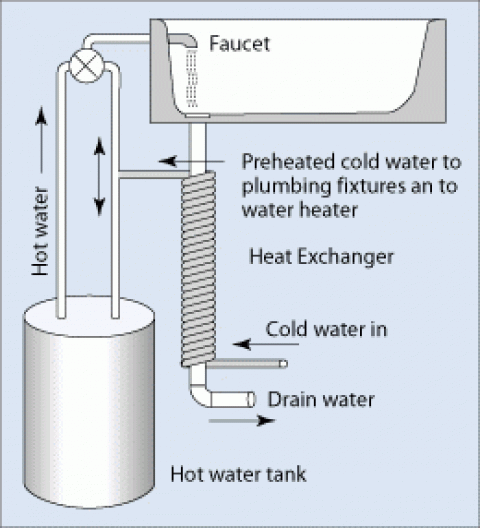How It Works
Drain-water heat recovery technology works well with all types of water heaters, especially with demand and solar water heaters. Drain-water heat exchangers can recover heat from the hot water used in showers, bathtubs, sinks, dishwashers, and clothes washers. They generally have the ability to store recovered heat for later use. You’ll need a unit with storage capacity for use with a dishwasher or clothes washer. Without storage capacity, you’ll only have useful energy during the simultaneous flow of cold water and heated drain water, like showering.
Some storage-type systems have tanks containing a reservoir of clean water. Drain water flows through a spiral tube at the bottom of the heat storage tank. This warms the tank water, which rises to the top. Water heater intake water is preheated by circulation through a coil at the top of the tank.
Non-storage systems usually have a copper heat exchanger that replaces a vertical section of a main waste drain. As warm water flows down the waste drain, incoming cold-water flows through a spiral copper tube wrapped tightly around the copper section of the waste drain. This preheats the incoming cold water that goes to the water heater or a fixture, such as a shower.
By preheating cold water, drain-water heat recovery systems help increase water heating capacity. This increased capacity really helps if you have an undersized water heater. You can also lower your water heating temperature without affecting the capacity.
Cost and Installation
Purchase prices for drain-water heat recovery systems range from $300 to $500. You’ll need a qualified plumbing and heating contractor to install the system. Installation will usually be less expensive in new home construction. Paybacks range from 2.5 to 7 years, depending on how often the system is used, and the temperature of the incoming water, which is dependent on ground temperatures.



Recent Comments